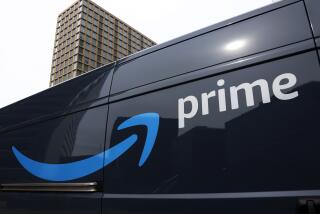Let the Marketplace Decide
- Share via
Early this week, five America Online customers filed a lawsuit in Los Angeles Superior Court demanding that the service provide its customers what it promised last fall, unlimited online time for $19.95 a month. So many new customers were attracted by that price that the system has become overwhelmed: sluggish response time and seemingly endless busy signals, exacerbated by a doubling of average online time to 32 minutes a customer a day.
Though only five customers are plaintiffs in the lawsuit, their attorney hopes to have the case certified as a class action representing all 7 million of AOL’s customers. The plaintiffs contend that AOL defrauded its customers by promising them unlimited use that its hardware and software simply could not provide.
In response, the Virginia-based service has taken aggressive steps, promising to spend $250 million in the next five months to upgrade equipment. Still, industry analysts like James Gleick (a former online service provider himself) are right to criticize AOL for failing to learn from the demand pressures seen last year when online providers like AT&T; and Pacific Bell offered unlimited access for $19.95.
“AOL,” Gleick says, “consistently arranges its network and marketing in a way that’s guaranteed to leave customer shortages.” Whether that’s so is up to the courts to decide. But AOL indeed appears to be inviting problems. Rather than postponing new online features certain to increase traffic and delays, for instance, the company on Tuesday added one of the nation’s leading online brokers, Charles Schwab & Co., to its basic service.
What grounds do the plaintiffs in the L.A. suit have in seeking “refunds and damages” to the tune of $20 million? They didn’t get what they were promised and are properly unhappy, but it’s not as though AOL put a gun to their heads. There are plenty other online servers prepared to take on AOL’s dissatisfied customers. Would we sue our health club if we showed up at rush hour and had to wait to board the Stairmaster? More likely, we would choose another hour--or another health club.
There may come a time when the Internet is as vital to our daily life as electricity and thus should be regulated more tightly by laws. It’s also possible that at some point online providers may be so insensitive to consumer needs that the government will have no choice but to step in--as it did in limiting the degree to which airlines could deliberately overbook flights. That time, however, has not yet come.
The completion in 1858 of what may be called the first World Wide Web--the transatlantic telegraph cable--offers an instructive lesson. Although first hailed for placing a “loving girdle ‘round the Earth” that would unite all as “brothers of one hearth,” the telegraph industry was soon assailed by lobbyists who thought the government should regulate the way it chose its customers, lest the cables become crowded by “wild youths and drunkards.”
The government’s choice not to intervene, many historians believe, helped the industry flourish in the free market, just as the Internet stands to do so today.






